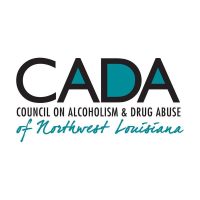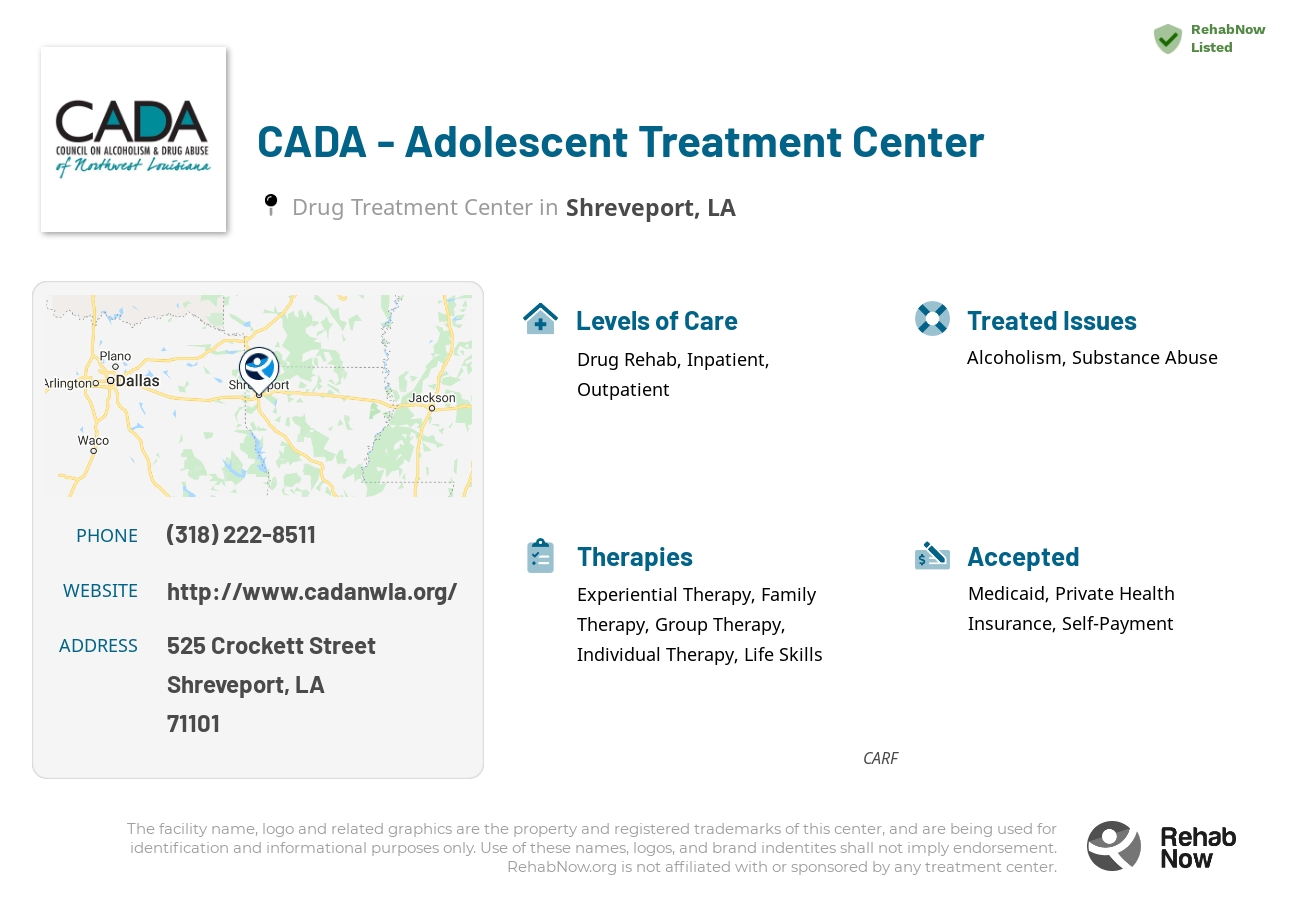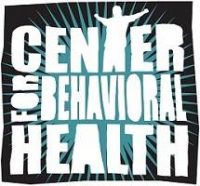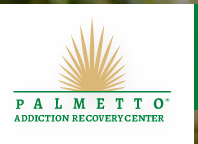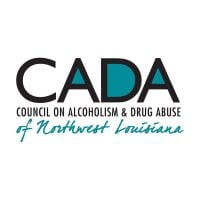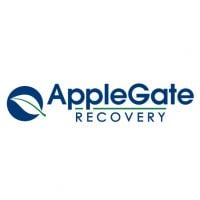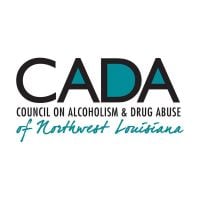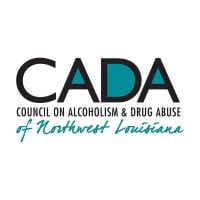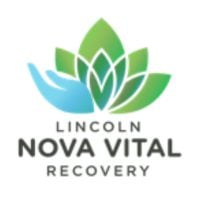CADA - Adolescent Treatment Center
Drug Rehab Center in Shreveport, Louisiana
CADA - Adolescent Treatment Center in Shreveport, Louisiana provides addiction treatment services for alcoholism, substance abuse, drug addiction, mental health, and opioid addiction through various levels of rehab, individual and group therapy, and evidence-based therapies, in a safe and accredited environment, with the option of private health insurance coverage.
About This Louisiana Facility
CADA - Adolescent Treatment Center, located in Shreveport, Louisiana, is a top-notch facility that specializes in treating individuals suffering from alcoholism, substance abuse, drug addiction, mental health issues, opioid addiction, and dual diagnosis. With certifications from CARF, SAMHSA, and a state license, CADA - Adolescent Treatment Center is dedicated to providing high-quality care and support to their patients. Offering a range of services, including drug rehab, inpatient treatment, outpatient programs, aftercare support, and dual-diagnosis treatment, this facility ensures that individuals receive comprehensive and personalized care to help them overcome their addiction and achieve lasting recovery.
At CADA - Adolescent Treatment Center in Shreveport, Louisiana, individuals struggling with addiction and substance abuse issues can find a variety of services to help them on their journey to recovery. The facility specializes in providing drug rehab, inpatient treatment, outpatient programs, aftercare support, and dual-diagnosis treatment. Their dedicated team of professionals works closely with patients to create personalized treatment plans that address their specific needs and challenges. With a focus on holistic care, CADA - Adolescent Treatment Center aims to not only address the addiction but also the underlying mental health issues that may contribute to it. By offering a range of services, the facility strives to provide comprehensive support at every stage of the recovery process.
Genders
Ages
Modality
Additional
Accreditations
State License
SAMHSA

CARF
The Commission on Accreditation of Rehabilitation Facilities (CARF) is a non-profit organization that specifically accredits rehab organizations. Founded in 1966, CARF's, mission is to help service providers like rehab facilities maintain high standards of care.
Conditions and Issues Treated
People who abuse drugs are likely to suffer from an addiction, which can cause serious health problems. When it comes to helping drug abusers get sober, there are many options to choose from. It is essential to state that there is no “”correct”” way of doing things. People are different, and they need different types of help to get over their addiction.
Levels of Care Offered at CADA - Adolescent Treatment Center
This center offers a variety of custom treatment tailored to individual recovery. Currently available are Drug Rehab, Inpatient, Outpatient, with additional therapies available as listed below.
Individuals who are suffering from severe addiction or have a high risk for dangerous health concerns are often recommended to receive inpatient treatment.
Choosing to enter an inpatient treatment program is beneficial for people who are suffering from severe addiction, or who have a high risk for dangerous health concerns.
Inpatient treatment is beneficial for:
- People who have a history of severe withdrawal.
- People who have attempted to overcome addiction on their own without success.
- People who have a history of relapse, or have recently relapsed.
- People at risk for drug overdose or withdrawal-related complications.
- People with medical conditions that are worsened by drug or alcohol use.
Outpatient treatment programs provide drug and alcohol addiction treatment through individual sessions with a counselor, group therapy, 12-step meetings, and other activities to help individuals gain sober living skills. Most programs are designed for those individuals who have completed a medically supervised detoxification program and provide opportunities for clients to begin the process of early recovery.
Outpatient programs also offer a level of medical support as needed and psychological backing through therapy. Clients are encouraged to live at home, though there may be some flexibility regarding this requirement based on the circumstances and needs of each patient.
Outpatient treatment is perhaps the most common type of dual diagnosis program available. It does not pose a significant financial burden on patients. However, it is essential to note that outpatient treatment does not provide the support and supervision given in residential programs. Some addicts may need this level of support to maintain their sobriety.
Therapies & Programs
Therapy sessions focused on the individual addict can provide much-needed guidance as they work toward overcoming their addiction. These types of sessions typically involve guidance from a therapist, who will help addicts identify and process their feelings and cravings.
During these sessions, addicts may develop plans for coping with the triggers that typically lead to relapse and learn how to avoid those triggers during their recovery process.
The main goal of family therapy for drug addiction is to create an environment where communication can occur without judgment, hostility, or blame that often occurs within a family.
Family therapy is a type of group problem-solving that aims to improve communication and relationships between the patient, their family, and sometimes friends. The therapist is with the family as they learn to communicate with each other differently, especially with the addict when s/he is using.
The family can learn to reduce their enabling behavior or rally together and support each other during tough times. The patient also learns how to deal with their addiction and maintain sobriety while interacting with the family.
Different types of addiction treatment services are available. Within this article, group therapy is of interest due to its high success rate compared to individual therapy. Group therapy settings are beneficial because they allow recovering addicts to build a strong support network.
Benefits of group therapy are:
- Reduces feelings of isolation
- Immediate access to social support in the form of fellow addicts in recovery
- Lowers risk of relapse
- Increases rate of sobriety
- Builds coping skills that can be applied to everyday life
Those struggling with addiction in Louisiana can benefit from learning certain life skills. It is not as simple as quitting drinking or taking drugs and thinking that the hard part is over. Being sober means living a whole new way of life. Many recovering addicts have found that they need to develop talents like time management, organization, communication skills, socialization skills, and self-esteem to make their life in sobriety work.
Drug and alcohol addiction can lead to a breakdown in life skills. Learning certain life skills can help those who are struggling with addiction. Life skills training at CADA - Adolescent Treatment Center in Shreveport, LA teaches patients skills such as time management, budgeting, and social abilities to improve their quality of life and prevent relapse.
An addict’s life skills are maladaptive, meaning they are counterproductive. An addict may have learned poor time management skills growing up, have a hard time budgeting money, or be socially awkward. An addict’s poor life skills can lead to relapse and the inability to achieve long-term sobriety. Life skills training teaches patients effective coping mechanisms, which can help them live a clean and sober life.
Patient Experience
Experiential Therapy at CADA - Adolescent Treatment Center
Experiential therapy is a form of psychotherapy where patients are asked to engage in activities such as role-play, poetry writing, music composition, exercising, or journaling to help process intense feelings. The aim of the therapy is to help patients access deeper, often hidden emotions by helping them explore their own body and mind.
Payment Options Accepted
For specific insurance or payment methods please contact us.
Is your insurance accepted?
Ask an expert, call (888) 674-0062
Additional Details
Specifics, location, and helpful extra information.
Shreveport, Louisiana 71101 Phone Number(318) 222-8511 Meta DetailsUpdated November 25, 2023
Staff Verified
Patient Reviews
There are no reviews yet. Be the first one to write one.
Shreveport, Louisiana Addiction Information
Louisiana is one of the top ten states in the nation for opioid-related deaths. One in ten high school students admits to regularly using prescription opioids for non-medical purposes. More than 225,000 Louisiana residents admit to regular heavy drinking and around 6% of the Louisiana population abuses alcohol. Marijuana use in Louisiana is most common amongst teenagers between the ages of 12 and 17 years old.
In Shreveport, LA, drug overdose rates are higher than the state average. Around 9,000 people in the city are addicted to drugs. In 2012, Shreveport accounted for 159 admissions for heroin use (10.4%) and 141 admissions for cocaine use (11.3%). Drug treatment in Shreveport, LA, typically begins with detoxification, followed by either inpatient or outpatient treatment. Treatment programs typically last for 30 to 90 days, depending on the patient's needs.
Treatment in Nearby Cities
- Jena, LA (110.6 mi.)
- White Castle, LA (223.2 mi.)
- Winnsboro, LA (120.9 mi.)
- Vinita, LA (296.2 mi.)
- Plattsmouth, LA (599.7 mi.)
Centers near CADA - Adolescent Treatment Center
The facility name, logo and brand are the property and registered trademarks of CADA - Adolescent Treatment Center, and are being used for identification and informational purposes only. Use of these names, logos and brands shall not imply endorsement. RehabNow.org is not affiliated with or sponsored by CADA - Adolescent Treatment Center.
